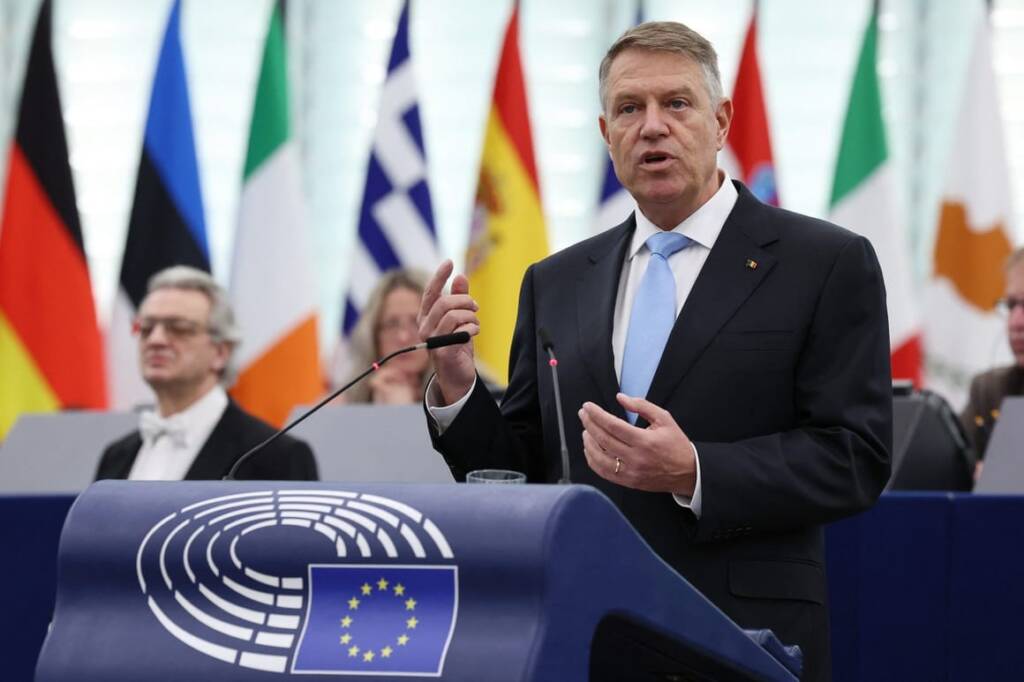Romanian President Klaus Iohannis tore into France, Baltic States, UK, Poland and the United States for their nefarious games.
Romanian President Klaus Iohannis minced no words when he took on France, Baltic States, UK, Poland and the United States for cashing in Ukraine for political gains. His statements offer a semblance of restraint amidst the rush towards nuclear escalation. His acknowledgment that NATO, as an entity, and Romania, in particular, will not intervene in Ukraine underlines a crucial point: the complexity of engaging in a conflict where direct military support is constrained by the political and legal frameworks of international alliances. His statement delineates a clear boundary, emphasizing the role of bilateral agreements over the collective defense mechanisms that NATO provides, thus sidestepping a direct confrontation.
Join us on Telegram: https://t.me/tfiglobal
In Iohannis’ words – formation of a “coalition of the willing,” as proposed by France and tentatively supported by other European nations, including the UK, the Baltic States and Poland, is a strategy fraught with ambiguity and legal loopholes. This approach actually risks exacerbating the situation. The eagerness of some to bypass established protocols for military engagement in favor of unilateral action is a deeply concerning sign of the times. The pursuit of such a coalition, especially under the guise of “security guarantees,” reveals a disconcerting willingness to engage in conflict without due regard for the broader implications on global stability and peace.
The discourse surrounding potential military interventions in Ukraine, particularly involving NATO members and nuclear-armed nations like France and the UK, is disturbingly cavalier about the grave risks of nuclear brinkmanship. The very notion that such actions could precipitate a direct clash with Russia—and that the United States might not only condone but actively support such escalations, possibly to the extent of threatening nuclear retaliation—is a dangerous gamble with global security.
Read More: Why Macron is SECRETLY SCARED of Ukraine
Moreover, the justifications for such brinkmanship, notably President Biden’s warnings about Russian ambitions extending beyond Ukraine, have been contradicted by assessments from within his own administration. The Office of the Director of National Intelligence, a pinnacle of the U.S. Intelligence Community, explicitly refuted the notion that Russia intends to wage war with NATO.
Iohannis further added that the potential for such actions to become deeply divisive domestically cannot be understated, especially considering the political landscape in the United States. The insistence on not deploying American troops to Ukraine, a stance rooted in the contentious nature of foreign military engagements among the American populace, sits uncomfortably alongside the specter of nuclear confrontation in support of European allies. This strategy not only risks global security but also threatens to polarize the American electorate.
The strategy of pushing Ukraine towards accepting a de facto partition, mirroring a Korean-like divide, as a means to avert a global conflict, reflects a deeply cynical manipulation of international crises for domestic political gain. This approach, positioning President Biden as a peacemaker who “averted World War III,” blatantly sidesteps the dire consequences of such conflicts, both for Ukraine and global stability. It not only trivializes the severe impact on Ukraine’s sovereignty and territorial integrity but also dangerously gambles with the lives and futures of millions, all for the sake of electoral politics.
Iohannis said that the orchestration of a “coalition of the willing” to intervene in Ukraine, buoyed by US presidential approval, is a precarious move that risks escalating tensions to a breaking point. This tactic, predicated on the assumption that Russia’s response to such provocations would inevitably lead to a temporary peak in hostilities before subsiding, is fraught with uncertainty and the potential for miscalculation.
Read More: NATO’s Ukraine Rhetoric meets a RUDE REALITY CHECK
This calculated risk, aimed at achieving a short-term de-escalation that could be politically leveraged, overlooks the broader implications of fostering a world where might dictates right, and where geopolitical objectives are pursued at the expense of principles of international law and human dignity. Such maneuvers not only betray a dismissive attitude towards the complexities of international diplomacy but also reveal a willingness to exploit those complexities for narrow political ends. The idea that this could all be engineered to conclude by a certain date, thereby shaping the narrative for an election campaign, exemplifies a troubling confluence of war mongering motives and political strategizing.
Did you know Romanian President Klaus Iohannis could be the next NATO chief despite being an underdog because the main contender is in Viktor Orban’s chokehold.
